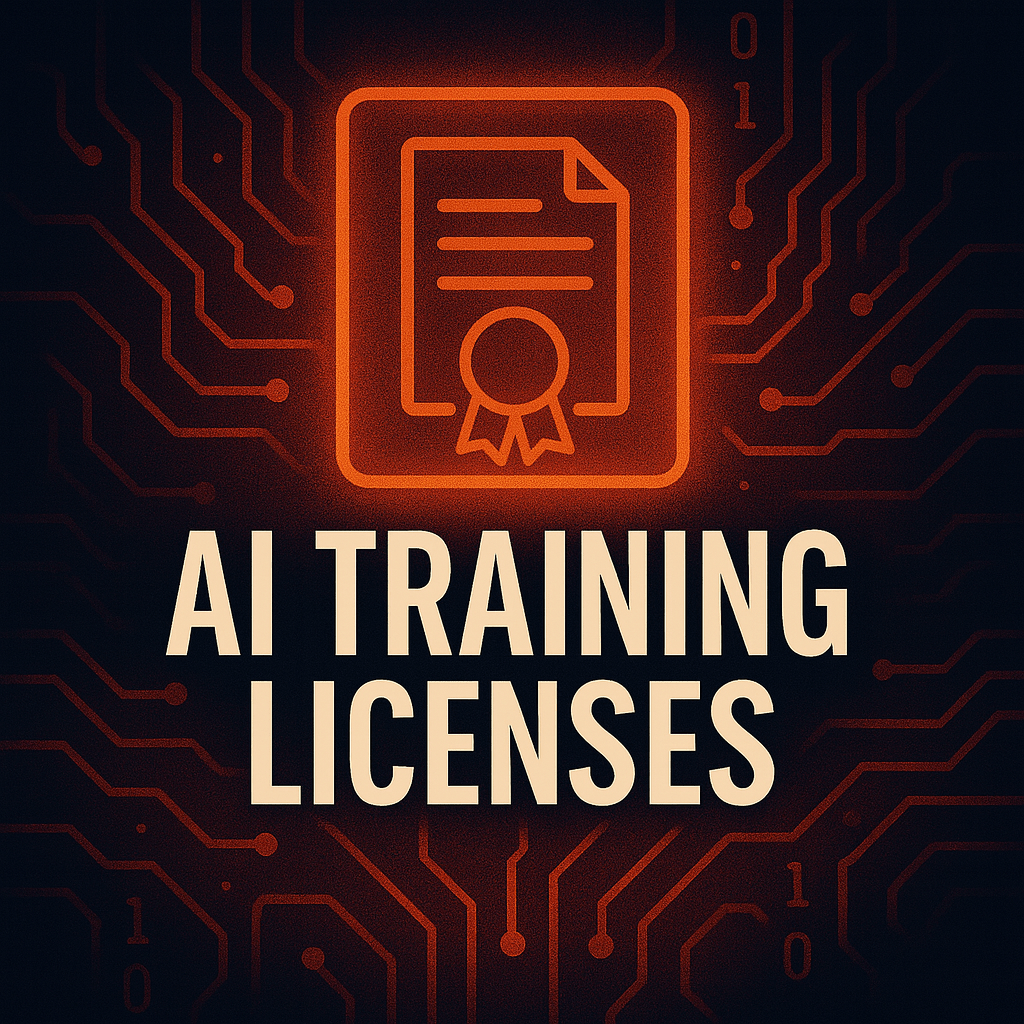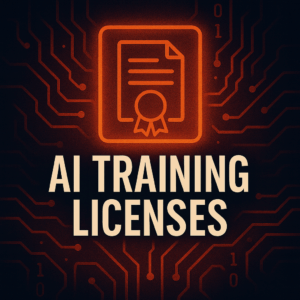Artificial intelligence is only as good as the data it’s trained on. But that data isn’t free for the taking—at least not legally. Whether you’re training a large language model, a vision system, or a specialized AI for healthcare or finance, obtaining the right licenses to use third-party content is essential.
Startups and technology companies are moving fast, but skipping over data licensing and legal compliance can lead to enormous liabilities, lawsuits, and even shutdowns. This blog breaks down what licenses you may need, what types of data require permission, and how to structure your AI training pipeline to align with U.S. law.
Why Do AI Models Need Licensed Training Data?
Every AI model learns by ingesting vast amounts of content—text, images, video, or structured data. That content is often protected by copyright, database rights, trade secrets, or even biometric privacy laws depending on its nature.
If your training corpus includes:
- Books or articles scraped from the internet
- User-generated social media posts
- Music, videos, or art
- Scientific or medical databases
- Personal biometric data or facial images
- Proprietary software logs or source code
…then you’re potentially using someone else’s intellectual property. Training an AI model on unlicensed content—even if you don’t reproduce the content word-for-word—can still trigger claims of infringement, unfair competition, or breach of terms of use.
What Types of Licenses Might Be Required?
There is no one-size-fits-all “AI training license,” but the type of license you’ll need depends on the nature of the data and how you’re using it:
1. Copyright Licenses for Creative Works
If your training corpus includes books, images, audio, or videos, you need explicit permission unless the content is:
- In the public domain
- Covered by a broad open license (e.g., Creative Commons)
- Used under fair use (which is fact-specific and risky at scale)
For startups scraping content from the open web, “terms of use” can function as a contractual license. If those terms prohibit automated scraping or AI training, proceeding anyway can trigger breach of contract claims—even if the content itself isn’t copyrighted.
2. Database Licenses
Structured databases (e.g., financial data, product catalogs, research datasets) may be subject to both copyright and sui generis database rights in jurisdictions outside the U.S. In the U.S., the structure of a database may not be protected—but the underlying data often is.
Obtain licensing from the dataset creator or provider, especially if the dataset was compiled through proprietary effort.
3. Biometric and Health Data Compliance
If your AI model uses facial recognition, speech, gait, or other biometric data—especially involving individuals in Illinois, Texas, or California—you must comply with:
- Illinois BIPA (Biometric Information Privacy Act)
- California Consumer Privacy Act (CCPA/CPRA)
- HIPAA, if working with patient health data
Consent must be affirmative, documented, and specific to the purpose of use, including AI training.
4. Open Source and Open Data Licenses
Some developers rely on open datasets for training (e.g., Common Crawl, Open Images, LAION). But these datasets often include scraped third-party content. While the dataset itself may be labeled open, the contents might not be.
Review license documentation closely and understand what rights are conveyed—and what risks you still retain.
 What Happens If You Skip Licensing?
What Happens If You Skip Licensing?
The legal landscape is evolving rapidly, but major lawsuits are already shaping precedent:
- Getty Images v. Stability AI: Alleged copyright infringement due to use of copyrighted photos in training a generative image model.
- New York Times v. OpenAI & Microsoft: Claims of unauthorized scraping and training on paywalled journalism.
- Doe v. Clearview AI: Biometric privacy violations from scraping facial images from social media.
The pattern is clear: courts and regulators are not turning a blind eye. A startup may not be able to withstand the kind of legal scrutiny currently applied to larger AI developers—but smaller companies are not immune from cease and desist letters, class actions, or bans from platforms and APIs.
How Can Startups Minimize AI Licensing Risk?
Legal compliance should not be viewed as a “legal speed bump.” It’s part of your core infrastructure. Here are steps technology startups can take to proactively manage AI training licenses:
- Conduct a training data audit: Catalog the sources, types, and legal status of your datasets.
- Review scraping methods: Automated data collection must comply with site terms and applicable laws.
- Secure licenses early: Especially for premium or proprietary content, negotiate licenses directly or use a data aggregator with clear licensing.
- Use indemnified providers: Some vendors now offer “clean room” datasets for AI training with indemnification.
- Document your model’s training process: Establish a reproducible training pipeline that can be disclosed to investors, acquirers, or courts if needed.
Do You Need a Lawyer to Draft or Review AI Training Licenses?
Absolutely—especially if you’re:
- Seeking venture capital investment
- Anticipating M&A or due diligence
- Deploying a commercial AI product
- Training models with sensitive personal data
- Engaging in cross-border data transfers
A technology attorney familiar with AI licensing law can draft enforceable contracts, review your compliance posture, and help you avoid hidden liabilities that could derail your product launch or acquisition timeline.
FAQs: AI Training License Compliance
Q: Is using public web content for training AI considered fair use?
Fair use is fact-dependent and not a blanket protection. Courts weigh purpose, amount used, market effect, and more. Training on entire works without permission is legally risky.
Q: Can open-source datasets be used freely for AI training?
Not always. The dataset may be labeled open, but its contents may include copyrighted or privacy-sensitive material. Review carefully.
Q: What if my AI is only for internal use?
Even internal models can trigger liability if they use unlicensed content or personal data. Scope of use matters, but it doesn’t eliminate all risk.
Call to Action
David Nima Sharifi, Esq., founder of the L.A. Tech and Media Law Firm, is a nationally recognized IP and technology attorney with decades of experience in M&A transactions, startup structuring, and high-stakes intellectual property protection, focused on digital assets and tech innovation. Quoted in the Wall Street Journal and recognized among the Top 30 New Media and E-Commerce Attorneys by the Los Angeles Business Journal, David regularly advises founders, investors, and acquirers on the legal infrastructure of innovation.
If your company is training AI and needs guidance on data rights and licensing, schedule your confidential consultation now by visiting L.A. Tech and Media Law Firm or using our secure contact form.



